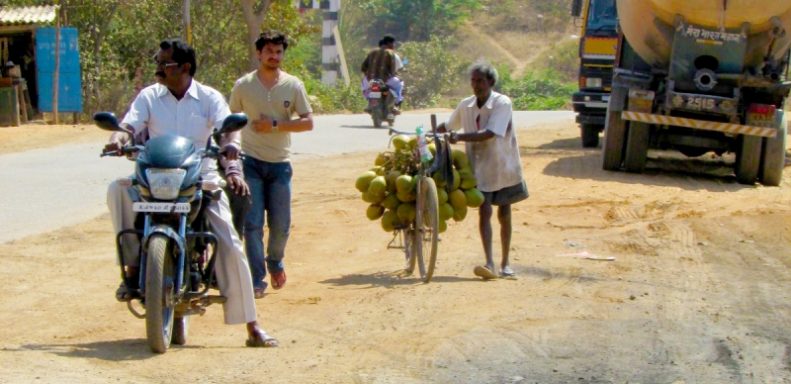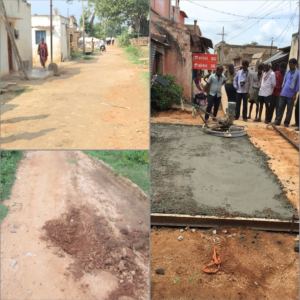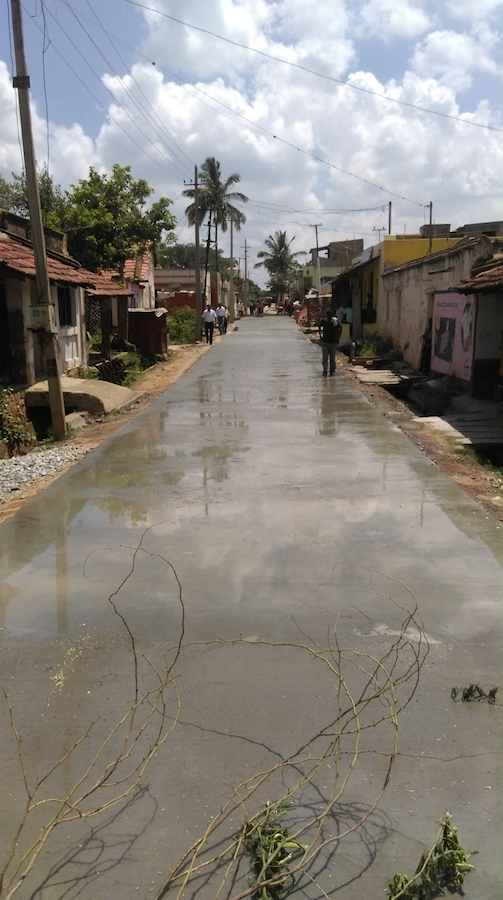

Thondebhavi is a rural village in Gauribidanur of Chikkaballapura district, Karnataka (outside of Bangalore, India). As per Census 2011, total of 1,148 families reside in the village, having a population of 4,791.
“During the monsoon months the village became completely unwalkable, let alone driveable, making it very difficult for residents to get their produce to market and to bring goods into the community,” says Nemy Banthia, CEO and Scientific Director of IC-IMPACTS. Typically, roads in India start to deteriorate in only 5 years due to poor construction material used, intense heat, heavy rains, and poor drainage.
However, residents living in the rural village can now get their produce to market year-round thanks to a Canadian innovation that could become the gold standard for future road construction.
Roads in India can start showing deterioration within 2 years of being laid due to poor materials, intense heat, poor drainage, and monsoons.
In early 2015, Canadian and Indian collaborators came together to build Thondebhavi’s first paved road, using a new super thin, low-carbon pavement that lasts longer and costs less than conventional roads made from concrete.
In October 2015, IC-IMPACTS completed construction of its advanced pavement project in Thondebhavi. The road is comprised of three different technologies in three different segments, with each using a different thickness and proportion of materials, or mix design. This approach allows the road to become a living research project that will physically demonstrate which segment of the road performs best.
Common to each section are super thin pavement technologies that significantly reduce the amount of cement needed in the construction of the road. Cement production is one of the single biggest contributors to greenhouse gas emissions, with each ton generating a matching ton of carbon emissions.
To create a more sustainable alternative, about 60% of this new road is made of locally sourced fly ash, a by-product of the thermal power industry that is often disposed of in lagoons, landfills and abandoned quarries. Some reports indicate that only 20% of the fly ash is recycled or reused in India.
The completed pavement transformed the local community of 1,000 people by improving their access to market for farmers, enabling improved accessibility for residents with mobility challenges, and by stimulating new construction and renovation along the road.
The 650-metre road connects to an existing road that feeds into a highway network linking to other towns and cities. In addition to providing the village with a critical transportation link, the road will also supply researchers and engineers with data on the pavement’s performance over the next five years.
Tests on the new super-durable pavement developed by IC-IMPACTS indicate that this new design will last at least 15 years.
46% of roads in India are unpaved and India needs 2.4 million km of rural roads!
The success gained in the Thondebhavi pavement project has already resulted in partnerships with two other states in India and Canada.. The foregoing IC-IMPACTS project will improve the lives of thousands of more people.

“The use of Canadian pavement technologies to support road improvement in Karnataka is a great example of how Canada can support India’s visionary initiatives towards building smart cities and infrastructure.”
Stanley Gomes, Acting Consul General, Consulate General of Canada in Bengaluru
“Dr. Banthia has introduced us to numerous innovative ideas that have allowed our business to tap into new international markets. We are confident that this relationship will help our business new opportunities of partnering with infrastructure companies in Canada”
Mr. Gunjan Sharma,, Senior Vice President, Reliance Industries Limited.
2024 IC-IMPACTS Conference in Delhi December 9 - 11, 2024 New Delhi, India